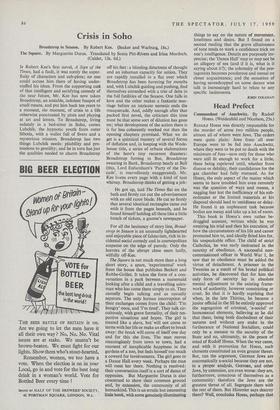Crisis in Soho
Broadstrop in Season. By Robert Kee. (Seeker and Warburg, 18s.) The Square. By Marguerite Duras. Translated by Sonia Pitt-Rivers and Irina Morduch.
(Calder, 12s. 6d.)
IF Robert Kee:s first novel, A Sign of the Times, had a fault, it was surely the super- fluity of characters and sub-plots; no one could accuse him there of having under- staffed his ideas. From the supporting cast of that intelligent and satisfying comedy of the near future, Mr. Kee has now taken Broadstrop, an amiable, indolent fusspot of small means, and put him back ten years to a moment, the moment, of crisis in a life otherwise punctuated by pints and playing at art and letters. To Broadstrop, living sedately in a bed-sitter in Soho, comes Lubchik, the hypnotic youth from outer Siberia, with a wallet full of fivers and a mysterious mission. Broadstrop has two things Lubchik needs: pliability and pre- tensions to gentility; and he in turn has just the qualities needed to charm Broadstrop
off his feet: a blinding directness of thought and an inhuman capacity for action. They are rapidly installed in a flat over which Broadstrop has been havering for months and, with Lubchik guiding and pushing, find themselves enmeshed with a trio of debs in the full futilities of the Season. One falls in love and the other makes a fantastic mar- riage before an intricate nemesis ends the masquerade. And, oddly enough after that packed first novel, the criticism this time must be that some sort of dilution has gone on; what development of the action there is is far less coherently worked out than the opening chapters promised. What we do get is a quizzical mastery of several forms of deflation and, in keeping with the Wode- house title, a series of urbane elaborations of the hero's tiny recurrent disasters: Broadstrop fuming in Bus, Broadstrop sweating in Bank, Broadstrop heady at Ball (this, Lord Enfurnham's 'Party of the De- cade', is marvellously exaggerated). Mr. Kee livens every page with a kind of taut whimsy. Broadstrop thinks of getting a job: He got up, laid The Times flat on the bath and firmly cut out the advertisement with an old razor blade. He cut so firmly that several identical rectangles came out with it from the pages beneath, and he found himself holding all these like a little bunch of tickets, a gnome's newspaper.
For all the hesitancy of story line, Broad- strop in Season is an unusually lighthearted and enjoyable piece of falstavism, rich in in- cidental social comedy and in cosmopolitan suspense on the edge of parody. Only the horrors of the abrupt close seem lazily, wilfully off-Kee.
The Square is not much more than a long short story, a spare, 'experimental' work from the house that publishes Beckett and Robbc-Grillet. It takes the form of a con- versation in a park between a nursemaid looking after a child and a travelling sales- man who has come there simply to sit. They casually begin talking and as casually separate. The only human interruption of their exchanges comes from the child: 'I'm hungry' once, and 'I'm tired'. They talk cir- cuitously, with grave formality, of their res- pective situations and hopes. The girl is treated like a slave, but' will not come to terms with her life or make an effort to break away: the break will come of itself one day and for this she lives. The man moves meaninglessly from town to town, had a moment of inexplicable happiness in the gardens of a zoo, but feels himself too much a coward for involvements. The girl goes to a Dance Hall every week. Perhaps the man will meet her there. Nothing is resolved: their conversation itself is a sort of dance of opposites. But Marguerite Duras is also concerned to show their common ground and, by extension, the community of all humankind. This is an erratic but interesting little book, with some genuinely illuminating things to say on the nature of movement, loneliness and desire. But I found on a second reading that the grave allusiveness of tone tends to work a confidence trick on one's intelligence. Details are purposely im- precise; the 'Dance Hall' may or may not be an allegory of sex (and if it is, what is it saying about it?); the solemnity of the pro- tagonists becomes ponderous and unreal on closer acquaintance; and the sensation of having eavesdropped on some decent wise talk is increasingly hard to relate to any specific incitements.
JOHN COLEMAN






































 Previous page
Previous page